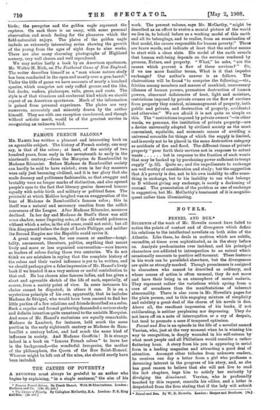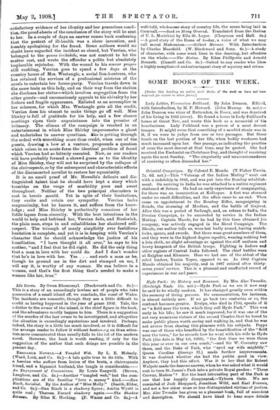NOVELS.
FENNEL AND RUE.*
STunEwrs of the work of Mr. Howells cannot have failed to notice the points of contact and of divergence which define his relations to the intellectual novelists on both sides of the Atlantic. Like them, he deals in motives which are subtle, recondite, at times even sophisticated, as in the story before us. Analysis predominates over incident, and his principal characters are addicted to introspection to an extent which occasionally amounts to positive self-torment. These features in his work can be paralleled elsewhere, but the divergences are quite as strongly marked. Though prominence is assigned to characters who cannot be described as ordinary, and whose course of action is often unusual, they do not move and have their being in an atmosphere of moral malaria. They represent rather the variations which spring from a, core of soundness than the manifestations of inherent abnormality. There is also room in Mr. Howells's pages for the plain person, and to this engaging mixture of simplicity and subtlety a great deal of the charm of his novels is due. Above all, the resultant impression of his books, if not. exhilarating, is neither perplexing nor depressing. They do not leave off on a note of interrogation or a cry of despair, but tend to promote a sane if tempered optimism.
Fennel and Rue is an episode in the life of a novelist named Verrian, who, just at the very moment when he is winning his. way to recognition, is deeply wounded in his self-esteem by- what most people and all Philistines would consider a rather flattering hoax. A story from his pen is appearing in serial form in a leading magazine and attracting a good deal of attention. Amongst other tributes from unknown readers, . he receives one day a letter from a girl who professes a devouring interest in the progress of his story, and, as she has good reason to believe that she will not live to read the last chapters, begs him to satisfy her curiosity by divulging the dinatiment. Verrian, who is profoundly touched by this request, consults his editor, and a letter is. despatched from the firm stating that if the lady will submit " Fennel and Bea By W. D. Howells. London : Harper and Brothers. 168.1 ,satisfactou evidence of her identity and her precarious condi- tion, the -proof-psheets of the conclusion of the story will be sent to her. In a couple of ,days an answer comes back confessing that the pretext of ill-health was a sheer invention, and humbly apologising for the fraud. Some authors would no .doubt have regarded the incident as closed, but Verrian, who 'belonged to the genus irritable, was not content to let the anatter rest, and wrote the offender a polite but absolutely implacable rejoinder. With the wound to his amour ppre still rankling, Verrian goes to spend a few days at the -country house of Mrs. Weetangle, a social lion-huntress, who has retained the services of a professional mistress of the revels to entertain her house-party. Verrian travels down in the same train as this lady, and on their way from the station -she discloses -her status-7-which involves segregation from the -other guests—and unconsciously appeals to his chivalry by her forlorn and fragile appearance. Enlisted as an accomplice in her schemes, for which -Mrs. Westangle gets all the credit, -Verrian does his utmost to make things go off well. Miss Shirley is full of guatitude for his help, and a few chance meetings ripen their acquaintance into the promise of intimacy. The climax -of the campaign is reached in an -entertainment in which Miss Shirley Impersonates a ghost and andertakea to answer questions. be is getting through -the ordeal with,,anniething more -than credit, when one of the -guests, drawing a bow at a venture, propounds a question which raises in an acute form the identical problem of fraud -which Verrian had schbitterly resented. Now, as our readers -will have probably formed a shrewd guess as to the identity -of Miss Shiuley, they will not be surprised by the collapse of the clairsoymte, or by the subsequent and characteristic efforts -of the disconcerted novelist to restore her equanimity.
It is no small proof of Mr. Howells's delicate and dis- tinguished talent that he should -have kept a story which trembles -on the -verge of -morbidity pure and -sweet throughout. Neither of the two principal characters is cast in heroic mould. Yet in spite of their limitations, they excite and retain our sympathy. Verrian lacks magnanimity, but he knows it, and suffers from the know- ledge ; and Miss Shirley is -pathetically conscious of her futile lapses from,sincerity. With the best -intentions in the world to help and befriend her, Verrian -fails, and Bushwick, the plain man, steps in and -rehabilitates her shattered -self- - respect. The triumph of manly eimplicity over fastidious hesitation is complete, and yet it is in keeping with Verrian's -diameter that he should acknowledge the justice of his humiliation.4‘ I have -thought it all over," he says to his mother, "and I feel that he did right. He did the only ;thing that a man in love with her could do. And I don't wonder that he'a in love with her. Yes . . . and-such a man ns though. he -ground me in the dirt and stamped on me, I will say it, is worthy of any woman. He can believe in -a woman, and that's the first thing that's needed to -make a woman like her, true."









































 Previous page
Previous page